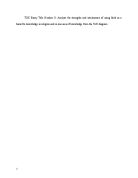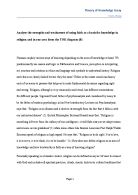Satirically, as opposed to other ways of knowing, emotional feedback is consequential to faith in religion, or is faith solely based on emotions or can there be a logical justification for religious convictions? For instance, a religious follower may refrain from war because he states that it is against Gods values i.e. he believes in the existence of the almighty. However, a person who does not believe in the existence of God may also abstain from war on the basis that war creates devastation of possessions, life and economic unsteadiness. The atheist is concerned about the resulting effects on the realistic world with proof rather than being influenced by emotion or belief. Emotion is particularly alike to faith when it comes to the fact that they belong in the sphere of private knowledge or in other words, both cannot be checked for by others. Anger, hunger and grief are all examples of elusive emotions that are impossible to calculate, but that doesn’t mean they don’t exist.
Since the world is not just a scatter graph sequence of data associated with our call for forming a pattern, it is necessary to have faith in the primary assumptions that preside over the universe. For example, Theists that are responsible for finding the causes for the existence of the universe base all their assumptions on the fact that a force called “God” is the first cause. It is only after claiming this prime postulation that one can add to the base of knowledge, even via the other ways of knowing.
To explore the topic further, the drawbacks and weaknesses of using faith as a way of knowing in Religion must be taken into account. Some people state that if faith is accepted as a lawful way of knowing, the world will become full of turmoil and disorder. This is due to the fact that faith is very ambiguous; it depends largely upon traditions, cultures, experiences and ones upbringing. If I was born and brought up in Greece with Greek culture, I would probably believe in the existence of Erebus, the God of darkness, and Aphrodite, the Goddess of love. Consumption of beef is something extremely normal amongst the Muslims; however, the same act arouses a sense of rage amongst the Hindus as the cow is considered to be a holy animal. When people connect religious experiences with their own culture and customs, they are biased when it comes to private incidences, gives rise to a sense of vagueness depending upon how the person feels and responds.
However, one can also declare that our faith is something “we perceive so deeply within ourselves as true that we don't have to discuss it, and no matter what anyone else says about it, it does not alter our reality. In this sense, we can say that experience just is. It cannot be proved or disproved. It can go to more and more profound levels of conviction, but it is generally only we ourselves who can testify to it.”
Belief gives rise to a persistent point of view and tendency toward a matter, which could be incorrect. Having immovable faith leads the mind to make solid decisions about a knowledge issue by shutting out the view points of all others. Islamic terrorist groups use faith as a knowledge issue to brainwash and shape the thinking of the naive youth so that they grow up to indulge in terrorist activities, under the impression that it was for their religion.
Natural science is based on a certain primary axioms that are obtained from faith. For instance, we believe that the sun is going to rise every day and set down when the moon comes up in the night. The fact that the sun rises each day can be proven by the process of induction-experience. However, the observation that the sun rises every day with a fixed pattern, does not particularly prove that it will do so in the days to come. Here we presume or have faith that the sequence of nature is constant. Once more, this shows that faith, even though ambiguous, cannot be justified or denied.
In opposition, the primary axioms and assumptions can be verified to be invalid, but if we have no faith or do not rely on our beliefs, there would be no preliminary point to a theory. We would never be able to reach any conclusions. “A logical, orderly universe, a rational mind, reliable senses, mathematical axioms, induction, and logical laws are just a few of the presuppositions required by science.”
While looking at Einstein’s universal hypothesis based on Relativity, he was questioned about how he would react if his investigations did not turn out to be related to the theory, to which he responded with a composed attitude, “so much the worse for the experiment, the theory is right!” His belief in this hypothesis, even when it was unverifiable, made him achieve the most far-reaching innovation of that period.
On the contrary, to plainly have faith in something (like the axioms) and go ahead with the findings is very likely to result in misleading conclusions that will be unreliable. This beats the point of there being sciences, making faith an unreliable way of gaining knowledge in the Natural Sciences.
Since Natural Science is an area of knowledge that requires the support of evidence for any observations made, there is little use of blind faith. For instance, if my cell phone stops working, I can pray to God to make it work again, but the probability that my faith will work is very little. It would only give me hope that my phone will start working again. Moreover, if I spend my money and send my phone to the repairs, where professionals will be dealing with the issue, there is a higher probability that my phone will start working again. This is because the professional will be using basic scientific methods to solve the problem and fix my phone.
As discussed earlier, personal knowledge, that is different for different people, can be shared via the use of faith. Hence, we need basic universal presuppositions to form an absolute structure of knowledge.
Wrapping up, I would like to say that Faith does play a crucial role as a way of knowing in the area of Religion, where everything is based on bias and perception, the two aspects directly linked to faith as they are private knowledge. Religion is something that comes from personal experiences and from within and that’s where faith is extremely vital. Furthermore, Faith acts as a foundation or base in all areas of knowing, Mathematics and Natural Science as well. The basic axioms of Mathematics and Natural Science are purely based on Faith, which led to us knowing all that there is in these fields today. However, overall, it causes more ambiguity and confusions and the world cannot rely upon faith alone. Justifications and evidences are also extremely essential, especially in areas of knowing such as Natural Science and Mathematics.
Works Cited
“ Hebrews 11:1 .” Biblos.com. N.p., n.d. Web. 20 Feb. 2012. <http://bible.cc/hebrews/11-1.htm>.
Lagemaat, Richard Van de. Theory of knowledge for the IB Diploma. N.p.: n.p.,
n.d. Print.
“Feedback: Are Scientists Really Biased by their Presuppositions?” 1:1 answers in genesis. N.p., n.d. Web. 21 Feb. 2012. <http://www.answersingenesis.org/articles/2007/07/13/feedback-interpreting-facts>.
Redstone, Julie. “BELIEF, FAITH, AND KNOWING.” lightomega. N.p., n.d. Web. 20 Feb. 2012. <http://lightomega.org/Ind/Pure/Belief_Faith_and_Knowing.html>.
"41) Quote: 'So much the worse for the experiment. The theory is right!'"
QUOTES. N.p., n.d. Web. 23 Jan. 2012. <http://agecon2.tamu.edu/
people/faculty/davis-george/quotes.html>.







